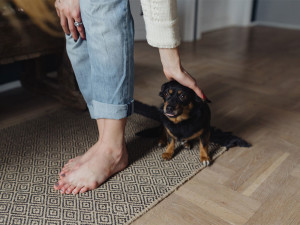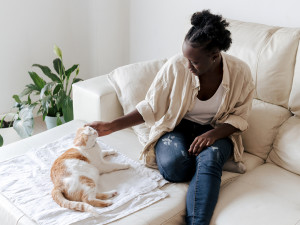Dogs Who Have Roommates at Shelters Are Less Stressed, New Study Finds
This often means they get adopted faster, too.

Share Article
We all get by with a little help from our friends — especially in stressful situations, when we lean on our people more than ever. It’s true for humans, but it’s also true for our pups, who are super social creatures. And the benefits aren’t just emotional: alleviating loneliness can have real-world impacts on dogs’ futures — especially those who are awaiting forever homes.
A new studyopens in new tab found that for shelter dogs, living with a roommate can significantly lower stress and help them get adopted more quickly.
Current shelter conditions stress pups out.
It’s no secret that dogs prefer to be social. In fact, one previous study foundopens in new tab that dogs with human and pup companions live longer than solo dogs. “Social connectedness — the quality and quantity of our friendships — is one of the components of our social environment that can have a strong impact on our health and well-being,” Dr. Noah Snyder-Mackler, an associate professor at the School of Life Sciences, Arizona State University, told us. “And this link between our social environments and our health extends to many social animals.”
But in shelters, dogs often aren’t allowed to be close with other animals. “Despite being a social species, dogs are often housed alone in shelters to reduce disease transmission and possible injury from inter-dog conflict,” Erica Feuerbacher, the study’s lead researcher, told Earth.com. opens in new tab

This isolation, in combination with the loud noises, limited space, and lack of stimulation in most shelters, can cause serious stress for pups. As a result, dogs can exhibit behavioral issues that they might not have under less anxiety-inducing circumstances, including aggression and barking — which make them seem less endearing to potential adopters.
Friendship alleviates stress in shelter pups.
For their study, researchers went to the Humane Society of Western Montana, where they paired half of the dogs with a companion and left half to remain in their kennels alone. They then observed the groups, keeping an eye on behavioral signs of anxiety like lip-licking, whining, and putting their ears back.
They found that single-housed dogs engaged in stress behaviors much more frequently than dogs who were given a companion, confirming that loneliness causes anxiety and behavioral changes.
Most strikingly, they also found that dogs who were given friends were quicker to be adopted. “Dogs housed together not only showed fewer stress behaviors, but they also were adopted, on average, four days sooner than single-housed dogs,” Feuerbacher told Earth.com.
This study is evidence that co-housing may be a way for shelters to improve the quality of dogs’ lives and increase adoptions in the future. Dogs who get to live with other pups aren’t just happier — they also behave more like they will when they’re able to socialize and receive love in their new homes. It’s a win-win for crowded shelters, potential adopters, and extroverted pups alike.

Sio Hornbuckle
Sio Hornbuckle is the Assistant Editor at Kinship, where they frequently write for the site. As a writer, they specialize in pet news, animal science, and pop culture. They live in New York City with their cat, Toni Collette.
Related articles
![Woman with tight curly black hair wearing a tan linen shirt and jeans sitting on a cream couch petting her tan and white cat who is laying on a blanket on the couch int he living room]()
How to Keep Your Cat From Having a Full Freakout When You’re Away
Cristin Tamburo, a.k.a. The Cat Counselor, gives essential advice on keeping your cats chill while you’re away.
![Woman petting her brown and white cat on the couch.]()
Does Your Attachment Style Affect How You Are as a Pet Parent?
You know you’ve wondered this...
![Dog Seeking Attention Owner Working On Laptop.]()
Why Is My Dog Being Clingy?
Your dog’s Velcro habits are cute—but not always convenient.
![A woman wearing a knit sweater holding a dog close on the floor of her bedroom.]()
Separation Anxiety in Dogs
Train your dog to stay calm when they’re on their own — instead of sad-singing “All By Myself” until you come home.
![two people bonding and smiling over a dog]()
Loneliness Is a Public Health Crisis. Pets Can Help
Per the US Surgeon General, loneliness is as dangerous for your health as smoking 15 cigarettes a day. Here are ways pets can solve that.
![Young Woman With Two Brown Dogs.]()
Research Finds Dogs With More Human and Animal Buddies Live Longer
A new study suggests that spending time with your pup isn’t just a way to avoid making plans; it’s great for their health.






